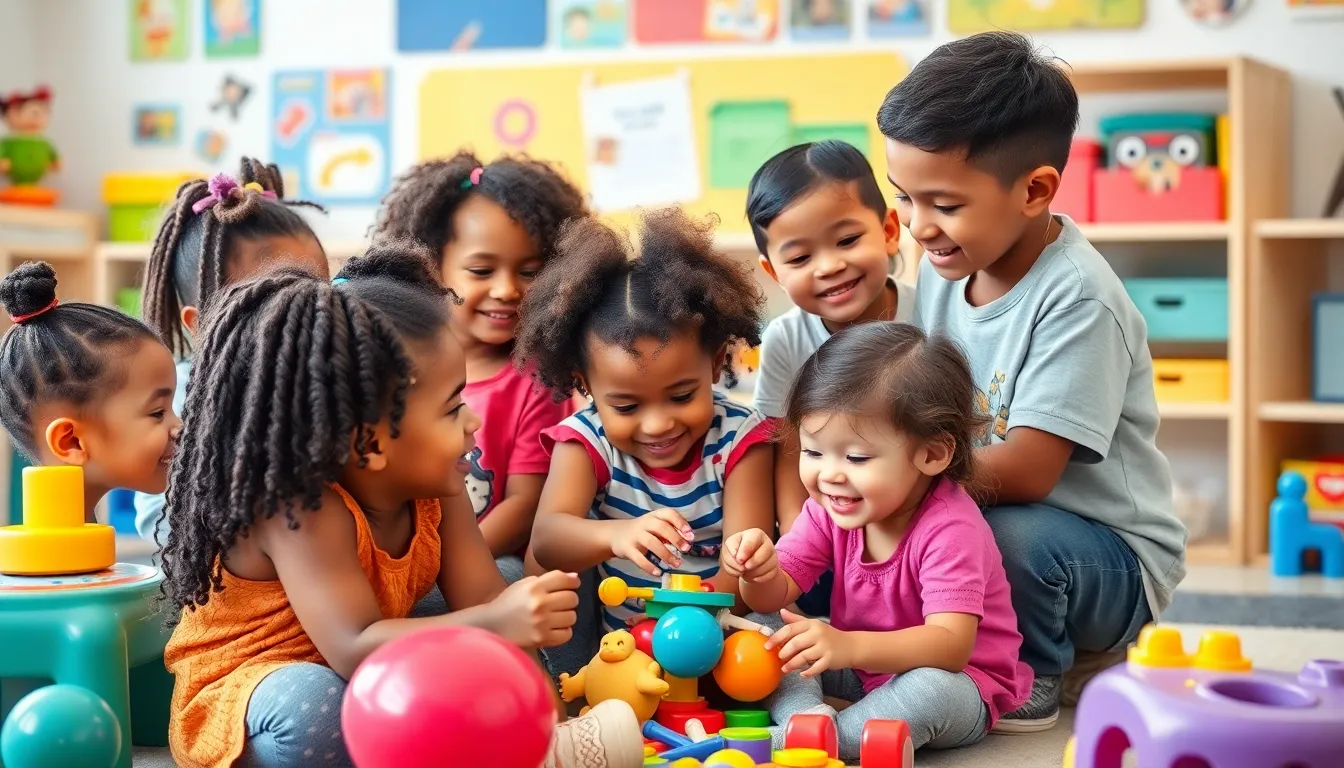Table of Contents
ToggleIn a world where toddlers wield crayons like tiny Picasso wannabes, preschool education emerges as the unsung hero. It’s not just about finger painting and snack time; it’s the launchpad for future geniuses, world-changers, and perhaps even the next great philosopher debating the merits of chocolate versus vanilla ice cream.
Early childhood education sets the foundation for lifelong learning, social skills, and emotional development. Think of it as the secret sauce that transforms your little one from a cute bundle of chaos into a confident, curious explorer ready to tackle the big leagues of kindergarten. Investing in preschool education isn’t just smart—it’s essential for nurturing well-rounded individuals who can navigate the complexities of life and maybe even help you find your misplaced keys.
Understanding Preschool Education Importance
Preschool education plays a vital role in shaping young children’s futures. This phase of education builds a strong foundation that supports lifelong learning.
Definition of Preschool Education
Preschool education includes structured learning environments for children typically ages three to five. It serves as an introduction to formal education while promoting cognitive growth, social skills, and emotional intelligence. Teachers use various play-based and interactive strategies to engage young learners. Schools focus on individualized learning, accommodating each child’s developmental pace. Parents often notice significant advancements in language and motor skills after enrollment in preschool programs.
Overview of Early Childhood Development
Early childhood development encompasses critical physical, cognitive, and emotional growth stages from birth to age eight. During this period, children experience rapid brain development, forming connections that influence learning and behavior. Language skills flourish through conversations, storytelling, and interactive activities. Social skills develop as children learn to share, cooperate, and resolve conflicts with peers. Emotional development occurs as kids begin to understand their feelings and those of others. Understanding these stages helps mothers and fathers foster a supportive environment essential for overall development.
Benefits of Preschool Education

Preschool education offers numerous advantages that significantly impact a child’s development. It creates a solid foundation for future learning and growth.
Cognitive Development
Cognitive development in preschoolers thrives through structured play and engaging activities. Children experience critical advancements in language acquisition, problem-solving abilities, and critical thinking skills. They also enhance their memory and attention span while exploring mathematical concepts through playful interactions. Research indicates that kids enrolled in high-quality preschool programs demonstrate improved academic performance during later schooling years. Learning to recognize letters, numbers, and shapes sets children up for success as they enter primary education.
Social and Emotional Skills
Social and emotional skills flourish in a preschool environment. Children practice sharing, cooperation, and conflict resolution with their peers, fostering positive relationships. They learn empathy and develop an understanding of diverse feelings, both their own and those of others. Teachers often guide them through interactions, creating opportunities to express emotions in healthy ways. Moreover, children gain confidence and independence as they navigate group activities. Early exposure to social settings helps reduce anxiety during transitions to formal schooling, ensuring kids feel more prepared for future challenges.
The Role of Teachers and Curriculum
Teachers and curriculum play vital roles in preschool education by guiding young learners through structured experiences. Effective teaching strategies enhance the learning environment.
Effective Teaching Strategies
Engaging in child-centered approaches fosters curiosity and instills a love for learning. Varying instruction methods accommodate diverse learning styles, ensuring each child receives personalized attention. Incorporating storytelling and music captivates children’s interest while reinforcing language skills. Regular assessment helps track progress and adapt teaching practices accordingly, allowing for ongoing development. Personalized feedback supports growth, enhancing children’s confidence and motivation.
Importance of Play-Based Learning
Play-based learning forms the cornerstone of preschool education. It encourages creativity, collaboration, and critical thinking. Through play, children explore their environment and develop problem-solving abilities. Interactive activities often lead to improved language skills as children communicate and negotiate during play. Social development occurs naturally as kids learn to cooperate and resolve conflicts. Research supports that children engaged in play-based learning retain information more effectively than traditional methods, making it an essential component of early education.
Impact on Long-Term Success
Preschool education significantly influences a child’s future success. Research shows that quality preschool programs lead to better outcomes in various areas of life.
Academic Achievement
Children who attend preschool often demonstrate higher academic performance throughout their educational journey. Numerous studies indicate that these children acquire advanced literacy, numeracy, and cognitive skills early on. For instance, 80% of students who participated in high-quality preschool programs score higher on standardized tests by the end of elementary school. These foundational skills enhance their ability to grasp complex concepts later in life. A focus on structured play and interactive learning environments promotes a love for education that persists into their later school years.
Social Adaptability
Social adaptability improves significantly through preschool education. Experiences in early education settings foster essential interpersonal skills like sharing and cooperation. Engaging with peers encourages children to navigate social dynamics, resolving conflicts and establishing friendships. Research suggests that kids who attend preschool are 30% more likely to have positive interactions with classmates. Such adaptability reduces anxiety during transitions to formal schooling and equips children with tools to handle diverse social situations. Early exposure to collaborative environments cement the foundation for lifelong social competence.
Preschool education lays a vital groundwork for children’s future success. It nurtures cognitive, social, and emotional skills that are essential for navigating life’s challenges. By engaging in play-based learning and interactive activities, children develop critical thinking and problem-solving abilities while forming meaningful relationships with peers.
The long-term benefits of quality preschool programs are undeniable. Children who experience these early educational opportunities tend to excel academically and socially as they grow. Investing in preschool education is not just an investment in a child’s early years; it’s a commitment to their lifelong journey of learning and personal growth.




